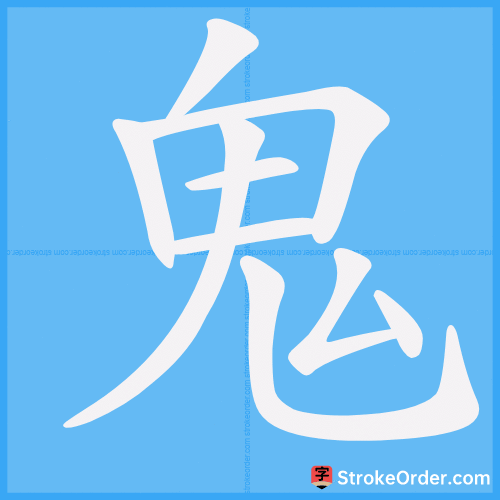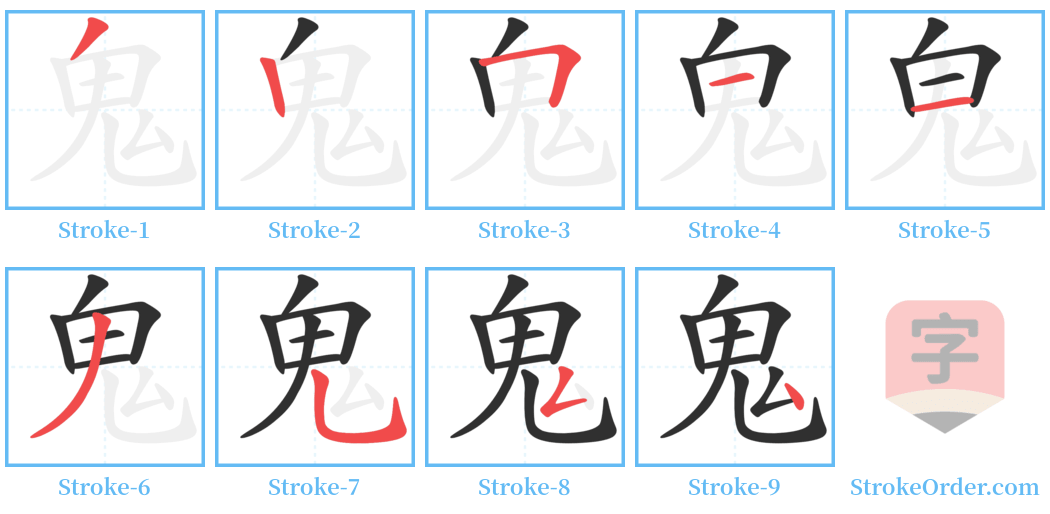鬼 Stroke Order
Animated Stroke Order of 鬼

Stroke Order Diagrams for 鬼

Step-by-Step Handwriting Guide for 鬼

Learn to Write Chinese Characters with Video Tutorials
Watch the video of writing the Chinese character "鬼", learn the correct stroke order (笔顺) of the character "鬼", and master the standard way of writing the character "鬼".
Free Printable Handwriting Practice with Stroke Order: 鬼
Printable Writing Practice Worksheet of "鬼" in Portrait Orientation (Tian Zi Ge)

Printable Writing Practice Worksheet of "鬼" in Landscape Orientation (Tian Zi Ge)

Information of 鬼
Pinyin
guǐ
Radical
鬼
Strokes
9 strokes
Usage
★★★★★
Definition
ghost / sly / crafty
鬼 [guǐ]
1. The soul of a person after death, referred to by some religious or superstitious beliefs.
鬼是死后灵魂的称谓,某些宗教或迷信者的相信。
2. Insidious or not open.
指阴险或缺乏光明的事物。
3. A derogatory or contemptuous term for a person.
用于形容人的蔑称或憎称。
4. Bad or terrible (limited to attributive use).
形容情况恶劣或糟糕(仅限做定语)。
5. Clever or quick-witted (often refers to children).
形容机灵或敏慧,通常指孩子。
6. A term of endearment.
表示亲昵的称呼。
7. A star name, one of the twenty-eight lunar mansions.
属于二十八宿之一的星名。
【引】
1. “鬼,人所归为鬼。” - “Ghosts are what people become after death.”
2. “众生必死,死必归士,此之谓鬼。” - “All beings must die, and when they die, they return to the earth; this is called a ghost.”
3. “载鬼一车。” - “Carrying a ghost in a cart.”
4. “为鬼为蜮。” - “To be a ghost or a monster.”
5. “苍颉作书鬼夜哭。” - “Cang Jie wrote the text and ghosts cried at night.”
6. “身既死兮神以灵,子魂魄兮为鬼雄。” - “When the body dies, the spirit becomes free, and the soul is a ghostly hero.”
7. “吾作此书时,尚是世中一人;汝看此书时,吾已成为阴间一鬼。” - “When I write this book, I am still a living person; when you read it, I will have become a ghost in the underworld.”
【例】
例如:鬼伯 (ghost king); 鬼雄 (strongest among ghosts); 鬼物 (ghostly entities); 鬼教 (teachings related to ghosts).
2. The essence or spirit of all things.
指万物之精怪或灵体。
【引】
1. “鬼者,老物之精也。” - “Ghosts are the spirits of old things.”
2. “庶人庶士无庙,死曰鬼。” - “Commoners and soldiers without tombs are called ghosts upon death.”
3. “山鬼吹灯灭,厨人语夜阑。” - “The mountain ghost extinguished the lamp; the cook spoke as night fell.”
4. “僧是愚氓犹可训,妖为鬼蜮必成灾。” - “A monk can still be trained, but demons and ghosts will surely cause disaster.”
【例】
例如:鬼王 (leader of the ghosts); 鬼车 (mythical vehicle with nine-headed birds); 鬼名 (the soldiers directed by the gods); 鬼卒 (ghost soldiers).
3. A person deeply addicted to bad habits or severely ill - usually used to insult someone.
形容那些深陷恶习或重病的人,通常用于骂人。
【例】
例如:酒鬼 (drunkard); 色鬼 (lecher); 烟鬼 (smoker); 鸦片鬼 (opium addict); 懒鬼 (lazy person).
4. A secretive or dishonest plot or scheme.
指不可告人的打算或阴谋。
【例】
例如:捣鬼 (to meddle secretly); 心里有鬼 (having a guilty conscience).
5. A term of endearment often used for children.
用于小孩或他人亲昵的称呼。
例如:小鬼 (little ghost); 机灵鬼 (smart little one).
6. A derogatory term for a person.
用于形容他人的轻蔑称谓。
例如:小气鬼 (stingy person); 吝啬鬼 (miser).
7. A fool or a heavy-handed person, generally used as an insult.
形容蠢人或莽撞的人,通常用来侮辱。
例如:死鬼 (dead person, often an insult); 老鬼 (old fool).
8. A surname.
作为姓氏使用。
【形】
1. Secretive or stealthy.
指隐秘或难以捉摸的状态。
【引】
1. “故明主之行制也天,其用人也鬼。” - “Thus, the actions of wise leaders are based on heaven; their use of people is secretive.”
【例】
例如:鬼促促 (secretive); 鬼诨 (to make excuses); 鬼慌 (acting hurriedly in secret).
2. Clever, smart, or exquisite (often implying surprising abilities).
指机灵、聪慧或精妙,通常蕴含意外的能力。
【引】
1. “这孩子真鬼。” - “This child is really clever.”
2. “突兀压神州,峥嵘如鬼工。” - “Suddenly towering over the land, as magnificent as a ghostly creation.”
【例】
例如:鬼工 (skillfully crafted; beyond human ability); 鬼才 (talented and bizarre person); 鬼幻 (changeable, like a spirit); 鬼出电入 (to move swiftly and unpredictably).
supernaturally fine craft (idiom); the work of the Gods / uncanny workmanship / superlative craftsmanship
Input Method for 鬼
Pinyin
gui3
Wubi
rqci
Cangjie
hui
Zhengma
nj
Four Corner
26513
Unicode
U+9b3c
Same Pronunciation Characters